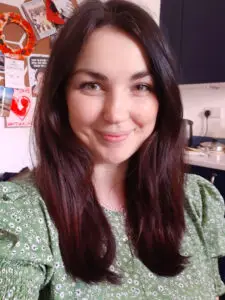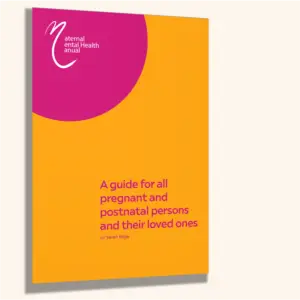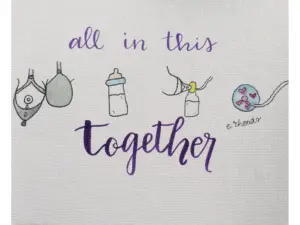Written by Sarah Edge
I am a Counsellor Psychotherapist, specialising in postnatal mental health in the United Kingdom. I am also a Mum of two small children. I recently wrote a guest blog on “The Process of Healing From Infant Feeding Trauma, Guilt, and Shame: When You Wanted To Breastfeed and Couldn’t” for the Fed is Best Foundation, and when I was asked to write again, I jumped at the chance. In this piece, I aim to examine the Fed is Best message through my therapist’s lens and discuss why the Fed is Best message is an essential part of healing and recovery.
It is well known amongst those in the psychology field, whether it be researchers, psychologists, or therapists, that people are often drawn to study and work in a field where they have personal experience. The well-regarded and highly accomplished trauma academic Bessel Van Der Kolk has described his research as “self-search.” And most have heard of the phrase “the wounded healer.” I am no different. I became interested in working therapeutically with postnatal mental health and infant feeding guilt due to my own experience of breastfeeding difficulties.
I personally have a complicated and emotional relationship with infant feeding. I experienced formula feeding my firstborn and breastfeeding my second child. I have personally undergone my own therapy and recovery, meaning I am now able to work safely and supportively with other women experiencing psychological distress compounded by, or sometimes caused by, their infant feeding experiences. But that’s not to say my heart doesn’t ache when I hear a mother sharing her raw and moving story of when breastfeeding didn’t work out.
I am a person-centered therapist.
This approach to talking therapy was developed by Carl Rogers. He theorised that for change and healing to take place, the therapist must provide three conditions.
- The first condition is “unconditional positive regard.”
An essential part of any therapeutic relationship is for the patient to feel accepted, safe, and (very importantly) not judged.
- The second condition is that the therapist be genuine and authentic in their relationship with their client to develop a therapeutic alliance.
This can be interpreted differently by different people, and there is a fine line between being real and sharing too much of your own experience. This is an area that I have spent a lot of time exploring and reflecting on.
3. The third condition is empathy—to respond sensitively and kindly to the client’s experience.
Some of my clients had negative experiences with health professionals who focused on the Breast is best message, which contributed to their infant feeding trauma and grief. Some of these experiences have been so distressing that they need to be certain they will not be faced with any more distress if they bring up infant feeding. A therapist should listen and provide the right conditions to facilitate self-discovery, growth, and healing. A good therapist has no agenda.
Why do I believe the Fed is Best message is an essential part of healing and recovery?
Their mission is to provide a nonjudgmental and compassionate support community for families, whether they are bottle-, breast-, or formula-feeding. The Foundation reassures parents that they are good parents and will bond with their baby while formula feeding or breastfeeding. It also provides evidence that their baby will thrive, whether formula-feeding or breastfeeding.
They provide parents with current research while examining outdated breastfeeding and formula-feeding myths. They also provide a safe source of comfort when breastfeeding doesn’t work out as planned by validating, believing, and listening to them when all they hear is “try harder” or “everyone can breastfeed.”
They empower parents who want to try breastfeeding again by providing them with an actionable breastfeeding plan that is specifically focused on their needs. They support and encourage parents to prioritize their mental health while finding individual solutions for breastfeeding, combo-feeding, or formula feeding. They also support mothers who don’t want to breastfeed and are struggling with societal pressure and shame and, instead, validate their desire not to breastfeed.
For healing and growth to take place we need to feel like we are not being judged, are safe and accepted which is exactly what the Fed is Best Foundation provides.
Because my practice is firmly rooted in a humanistic and person-centered approach, I have no preconceived ideas of what is “best” for other people and their children. I can be open and authentic in my approach and able to deeply empathise with the grief and sadness that can accompany infant feeding difficulties. No part of me will ever think it is acceptable to tell women what to do with their own bodies. And this doesn’t change when it comes to breastfeeding. I only want you to come to terms with what is best for you, your baby, and your family, and I believe that you and you alone know what that looks like.

Sarah is a counsellor and psychotherapist working both online and face-to-face at the Bump and Baby Hideout in Manchester, UK. Sarah specialises in postpartum mental health, with a particular interest in supporting women in their emotional recovery from breastfeeding difficulties and infant feeding guilt and trauma.

Sarah offers a Maternal Mental Health manual, an online guide designed to support mental health during pregnancy and postnatal. It can be read by either the mother herself or her friends and family, giving everyone a better understanding of the changes in her mental health that may occur during the transition to motherhood. And also, very importantly, what to do if you’re worried.
Do you need support? Please click here to join our support group.

Additional resources:
Women’s Choice Regarding Breastfeeding and Its Effect on Well-Being

Every set of circumstances is different… my daughter pumped with her first daughter and at 6 months started using formula… next daughter she nursed for 2 1/2 years and pumped… Third pregnancy was twin boys. She tried to nurse and pump. And gave them formula.. she lives her children and they are all well fed